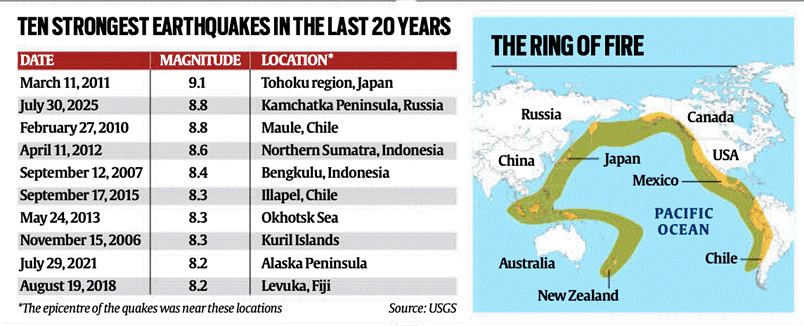Core Event Overview
- A massive 8.8 magnitude earthquake struck the Kamchatka Peninsula in Russia’s far-east on July 30, 2025.
- Epicenter: Approximately 500 km east of Moscow, affecting northern Pacific Ocean regions.
- It triggered a tsunami alert across several countries, including those on both sides of the Pacific Ocean.
- Tsunami waves were recorded (up to 3 meters) in some places such as:
- Alaska Peninsula
- Petropavlovsk-Kamchatsky in Russia
- Hokkaido in Japan
- Minor flooding was reported but no significant damage or loss of life was initially confirmed.
Relevance : GS 1(Geography)

Seismic Context: Ring of Fire
- The epicenter lies on the Circum-Pacific Seismic Belt, famously known as the “Ring of Fire”:
- A horseshoe-shaped seismic belt encircling the Pacific Ocean.
- Accounts for ~80% of the world’s strongest earthquakes.
- This region experiences frequent and violent tectonic activity due to:
- Presence of multiple subduction zones.
- Convergent plate boundaries where oceanic plates sink beneath continental or other oceanic plates.
Global Comparison: Top Earthquakes (Past 20 Years)
- The Kamchatka quake ties for 2nd place (8.8 magnitude) among the top 10 earthquakes since 2005:
- Strongest: Tohoku, Japan (2011) – 9.1
- Other notable 8.8 quakes: Chile (2010), Sumatra (2005), Kamchatka (2025)
- Pattern: Most quakes in the top 10 have occurred within the Ring of Fire.
Why So Active: Tectonic Process in Kamchatka
- Kamchatka Peninsula is one of the most active geological zones due to:
- Subduction of the Pacific Plate beneath the Okhotsk Plate.
- This tectonic movement causes:
- Build-up of seismic stress
- Sudden release of energy as earthquakes
- This region has recorded over 130 significant quakes of >7.5 magnitude since 1900.
- Notable event: 1952 earthquake of magnitude 9.0 in the same region.
Mechanism of Subduction Quakes
- Process:
- Two plates collide, and one subducts under the other.
- This builds up immense stress until sudden rupture and energy release occurs.
- Subduction-zone quakes are:
- Longer in duration
- Often followed by tsunamis
- Deep-focus in nature, affecting a wider area
Scientific and Risk Implications
- Earthquake in Kamchatka serves as a case study for:
- Seismic hazard preparedness.
- Plate tectonics and deep-focus earthquakes.
- Scientists warn of ripple effects across other Ring of Fire zones.
- Particularly vulnerable zones: Japan, Alaska, Indonesia, Chile
- Modern data collection helps predict aftershocks and assess tsunami risks.
Human & Policy Implications
- Kamchatka is sparsely populated: ~362,000 residents, mostly in Petropavlovsk.
- Hence, damage and casualties were relatively low despite the quake’s strength.
- Had a similar magnitude quake occurred in a densely populated area (e.g., Nepal 2015), the human toll could be much higher.
- Underscores the need for:
- Seismic early warning systems
- Disaster readiness even in less populated but seismically active areas
Geopolitical and Global Preparedness Lessons
- Events like this:
- Highlight the interconnected nature of seismic risks in the Pacific.
- Stress the importance of transnational cooperation on early warnings and mitigation.
- India, although not in the Ring of Fire, can learn from:
- Japan’s model of community drills, building codes, and real-time alerts.
Conclusion: Key Takeaways
- The Kamchatka quake is among the top three strongest quakes of the century so far.
- It reaffirms that seismic unpredictability remains high in the Ring of Fire.
- Preparedness, awareness, and advances in tectonic science are critical to minimizing human impact.
- Russia’s quake is a warning signal for all nations vulnerable to tectonic movements—especially those along subduction zones.



